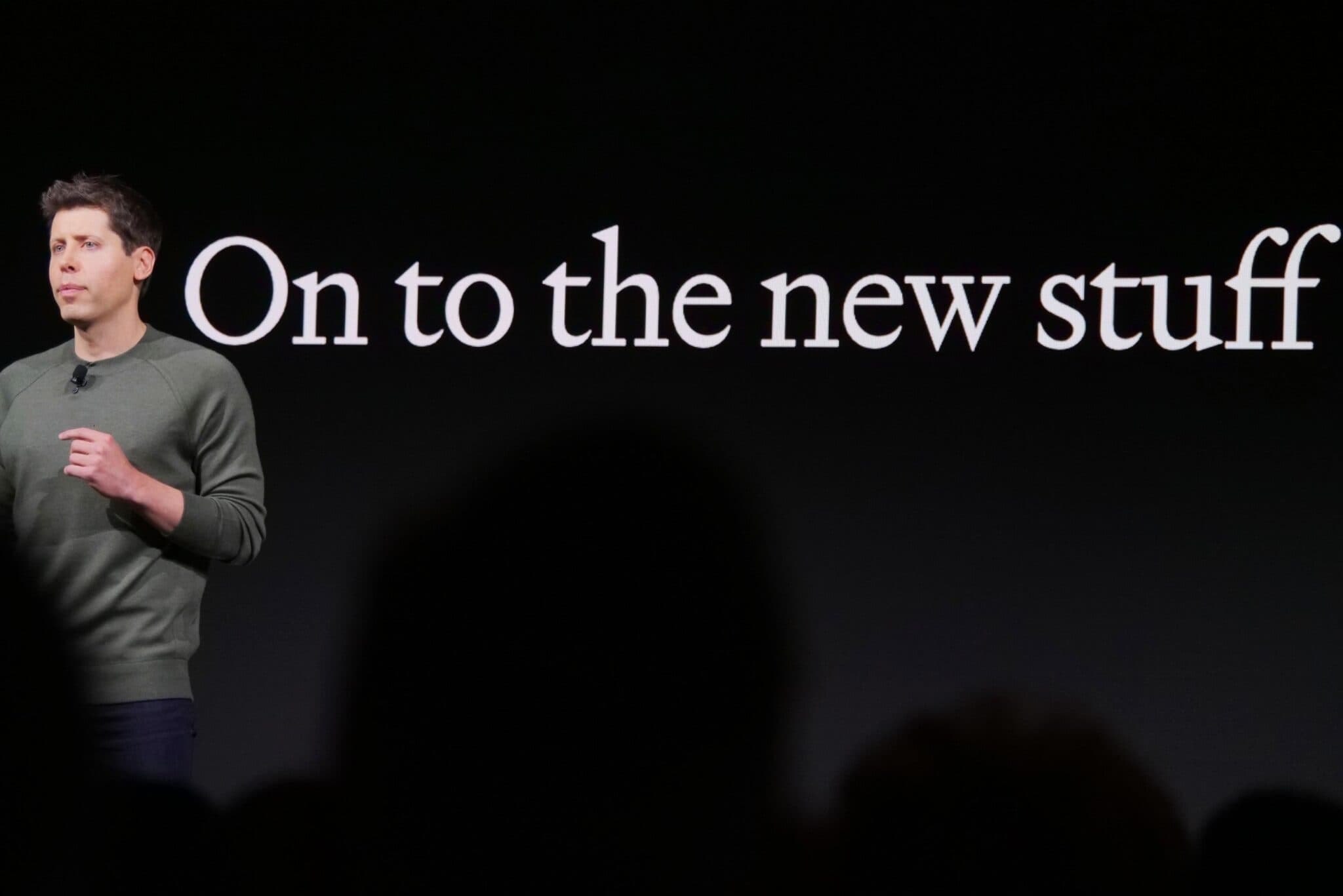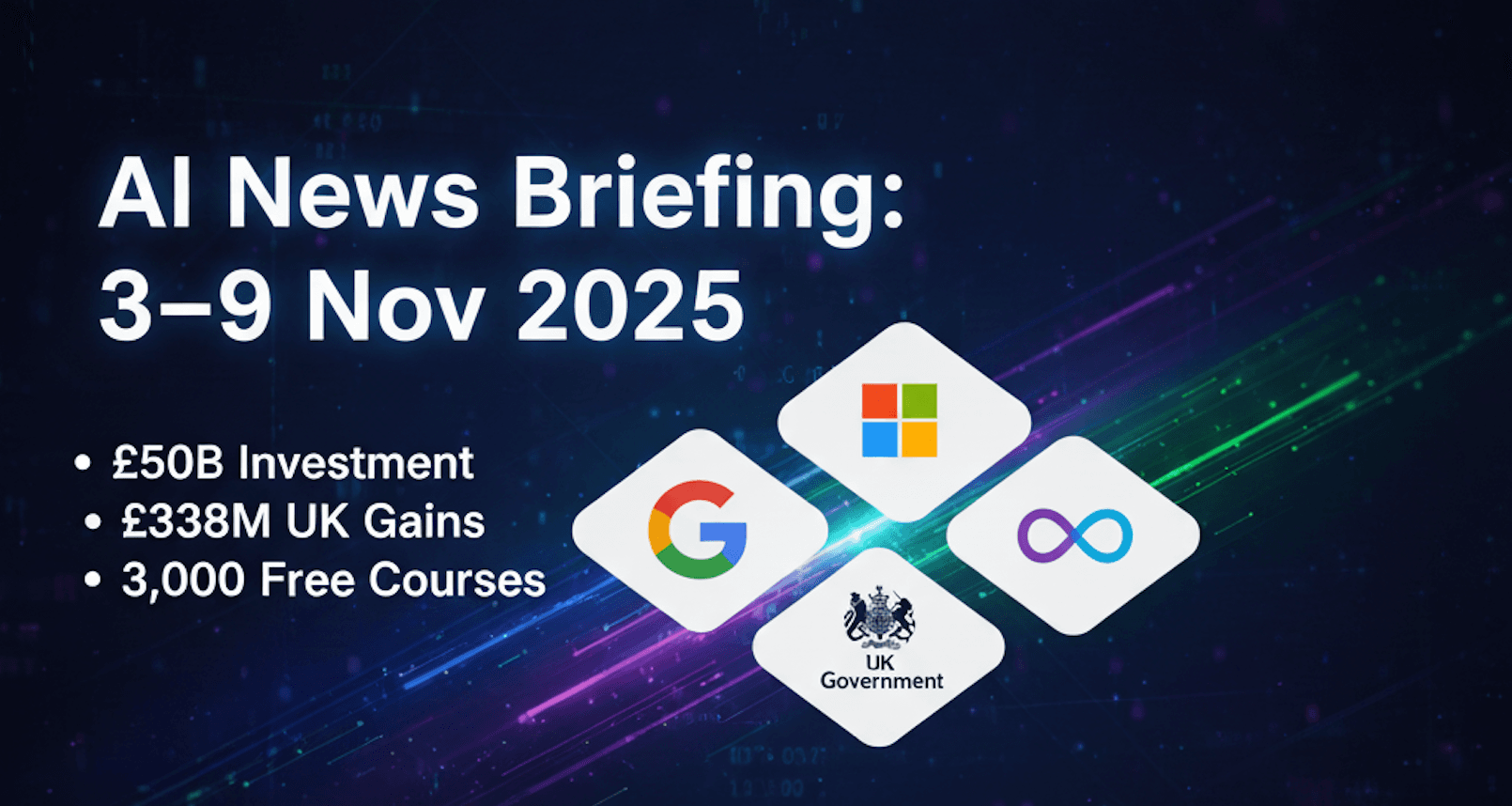AI Breakthroughs This Week: What UK Business Owners Need to Know (20-26 Oct 2025)
Google lost £120bn, OpenAI launched ChatGPT Atlas browser, UK regulatory sandboxes went live, and over £2bn in AI funding was deployed. Complete analysis of the week AI went ballistic for UK SMBs.
Jake Holmes
Founder & CEO

This week the AI industry shifted from infrastructure to impact. Google's market value dropped £120 billion in a single day. OpenAI and AMD announced partnerships worth tens of billions. The UK government launched regulatory sandboxes that give British businesses a decisive advantage over European competitors.
If you missed this week in AI (20-26 October 2025), you missed the moment everything changed. This isn't hyperbole. This is £100+ billion in infrastructure deals, government regulatory frameworks going live, and the launch of AI products that will fundamentally alter how your customers find and buy from you.
The bottom line: 91% of UK SMBs using AI report revenue increases, and this week just removed the three biggest barriers stopping you from joining them.
What happened to Google's £120 billion market wipeout?
Quick answer: OpenAI launched ChatGPT Atlas, an AI-powered browser that directly challenges Chrome's dominance, causing Google's market value to drop £120 billion overnight on 21 October 2025.
OpenAI launched ChatGPT Atlas, an AI-powered browser featuring built-in ChatGPT integration, browser history tracking for personalised responses, and "agent mode" that automates web tasks for paying subscribers.
Microsoft fired back two days later with enhanced Copilot Mode for Edge browser. The timing wasn't subtle. Neither was the functionality – AI integration with tab awareness, automated Actions for booking and form-filling, and collaborative Groups for up to 32 users.
The browser wars just became the AI wars. Your customers will soon browse the web by having conversations with AI assistants, not typing into search boxes.
What this means for UK businesses: If your website isn't optimised for AI search engines, you're about to become invisible to a massive segment of your market. Traditional SEO is dying. Generative Engine Optimisation (GEO) is the only game that matters now.
Why did the UK government just hand SMBs an AI advantage over European competitors?
Quick answer: The UK announced regulatory sandboxes and the AI Growth Lab on 21 October, allowing companies to test AI products under temporarily relaxed rules whilst Europe drowns in compliance red tape.
The UK announced regulatory sandboxes and the AI Growth Lab on 21 October, allowing companies to test AI products under temporarily relaxed rules in healthcare, professional services, transport, and manufacturing. A £1 million pilot fund went to MHRA for AI drug discovery tools.
This isn't theoretical. The Ministry of Justice equipped 2,500 probation officers with ChatGPT Enterprise, expected to save 240,000 days of administrative work annually. The UK government's "Consult" AI tool analysed 50,000+ consultation responses in two hours – potentially saving £20 million in staffing costs.
Meanwhile, Europe's AI Act creates compliance nightmares. The UK positioned itself as the world's most pro-innovation AI jurisdiction whilst maintaining safety standards.
The competitive advantage: UK businesses can now test and deploy AI solutions months or years ahead of EU competitors drowning in regulatory compliance. The sandbox lets you experiment with healthcare AI, professional services automation, and manufacturing optimisation without the full regulatory burden.
What's this UK data sovereignty solution everyone's talking about?
Quick answer: OpenAI launched UK data hosting on 24 October, enabling British businesses to store data on UK soil when using OpenAI's API Platform, ChatGPT Enterprise, and ChatGPT Edu.
OpenAI launched UK data hosting on 24 October, enabling British businesses to store data on UK soil when using OpenAI's API Platform, ChatGPT Enterprise, and ChatGPT Edu. This removes the primary barrier stopping regulated industries from adopting AI.
Financial services firms, legal practices, healthcare providers, and any business handling sensitive data can now use ChatGPT without shipping client information to American servers.
Stargate UK followed on 22 October – a partnership between OpenAI, NVIDIA, and Nscale deploying sovereign compute capabilities. OpenAI will access up to 31,000 GPUs over time across multiple UK sites, including Cobalt Park in the North East AI Growth Zone.
The FCA's "Supercharged Sandbox" with NVIDIA went live in October, giving financial services firms access to accelerated computing combined with regulatory guidance. Fifty-one applications were received for the first cohort.
For UK SMBs: The three biggest AI adoption barriers – regulatory uncertainty, data residency concerns, and lack of computing infrastructure – just evaporated in a single week.
How big were the AI infrastructure deals announced this week?
Quick answer: Over £100 billion in infrastructure partnerships were announced, including OpenAI-AMD (tens of billions), OpenAI-NVIDIA (£80bn), and Anthropic-Google Cloud (multi-billion).
Absolutely massive. OpenAI and AMD announced a partnership worth tens of billions to deploy 6 gigawatts using AMD Instinct MI450 Series GPUs. AMD granted OpenAI warrants to purchase 160 million shares (approximately 10% ownership) at one penny each. AMD shares jumped 34% to £162, adding £60-80 billion in market value.
Then OpenAI and NVIDIA announced a partnership to deploy at least 10 gigawatts of NVIDIA systems, with NVIDIA investing up to £80 billion as infrastructure gets deployed. First 1-gigawatt phase scheduled for second half 2026.
Anthropic and Google Cloud announced a multi-billion-pound deal granting Anthropic access to up to one million TPUs. IBM and Groq partnered to deliver 5X faster AI inference at lower cost for enterprises.
The significance: These aren't incremental improvements. This is the computing infrastructure for the next decade of AI development. The partnerships also diversify supply chains – reducing dependence on single chip suppliers and driving competition that benefits end users.
What AI tools launched this week with proven ROI for UK businesses?
Quick answer: Microsoft Copilot Studio 2025 Wave 2, Salesforce Agentforce 360, Meta Business AI, Google Veo 3.1, and Anthropic Claude Haiku 4.5 all launched with measurable business impact.
Microsoft Copilot Studio 2025 Wave 2 launched in October with no-code AI agent building capabilities. Organisations report feeling like they've gained a 24/7 workforce with 4-hour per person weekly time savings. It's integrated with Microsoft 365 subscriptions.
Salesforce Agentforce 360 launched autonomous AI agents for SMBs handling 24/7 customer service and automated sales processes. The results are extraordinary: 91% of SMBs with AI report revenue boosts, 90% report improved operational efficiency, and 87% see help scaling operations.
Meta Business AI launched on 2 October as a sales agent automating customer interactions across Facebook, Instagram, and business websites. Includes virtual shopping assistant and AR try-on features.
Google Veo 3.1 launched 15 October with native audio generation creating videos up to 60 seconds at 1080p resolution. Pricing: £0.12/second (Fast mode) and £0.32/second (Standard mode). Over 275 million videos generated demonstrate massive adoption.
Anthropic Claude Haiku 4.5 delivers flagship-level capabilities whilst running 4-5 times faster at approximately one-third the cost. Ideal for deploying intelligent, low-latency customer service bots.
The ROI data: 74% of executives achieve ROI within the first year. 71% see revenue increases, with 53% reporting 6-10% gains. Google AI campaigns deliver 17% higher ROAS than manual campaigns.
Which startups raised the most funding this week?
Quick answer: Over £2 billion was raised across 40+ deals, with Crusoe Energy Systems raising £1.1bn, OpenEvidence raising £160m, and Uniphore raising £208m leading the pack.
The venture capital floodgates opened. Here's the highlight reel from 20-26 October:
Monday, 20 October:
- Fal.ai raised £200 million Series D at £3.2 billion valuation for multimodal AI infrastructure
- Findem secured £41 million Series C for AI talent platform using "3D talent data"
- AdsGency raised £9.6 million seed for autonomous advertising workflows
- Finster AI (London) raised £12 million Series A for finance professionals' AI assistant
Tuesday, 21 October:
- Anrok raised £44 million Series C for automated global tax calculations (critical for UK SMBs selling internationally)
- ChipAgents secured £17 million Series A for AI-driven semiconductor design
- Serval raised £37 million Series A for AI agents automating IT service management
Wednesday, 22 October:
- UnifyApps raised £40 million Series B at £200 million valuation for enterprise workflow automation
- OpenEvidence secured £160 million Series C at £4.8 billion valuation for clinical decision support (15 million+ monthly consultations)
- David AI raised £40 million Series B for audio AI research infrastructure
- Uniphore raised £208 million Series F at £2 billion valuation for conversational AI
Thursday, 23 October:
- Redwood Materials raised £280 million Series E for battery recycling (founded by Tesla's former CTO)
- Chainguard secured £224 million growth funding at £2.8 billion valuation for software supply chain security
- ShopMy raised £56 million Series B at £1.2 billion valuation connecting 185,000+ creators with 1,200+ brands
Friday-Saturday, 24-26 October:
- Crusoe Energy Systems raised £1.1 billion Series E at £8 billion valuation for sustainable AI data centres
- Sesame raised £200 million Series B from Sequoia for AI-powered smart glasses
- Nexos AI raised €30 million Series A for enterprise AI governance (critical for GDPR compliance)
Total raised this week: Over £2 billion across 40+ deals. AI companies now capture 51% of all venture capital globally.
What's this thing about Anthropic giving Claude a memory?
Quick answer: Anthropic expanded Claude's Memory feature to all Pro (£16/month) and Max (£80-160/month) subscribers on 23 October, allowing the AI to retain context across conversations.
Anthropic expanded Claude's Memory feature to all Pro (£16/month) and Max (£80-160/month) subscribers on 23 October. The AI can now retain context across conversations, with project-specific memory spaces and full user control over stored memories.
This matters because it eliminates the frustration of re-explaining context every single conversation. Your AI assistant actually remembers your business requirements, writing style, client details, and project specifics.
Claude for Life Sciences launched 20 October, integrating with Benchling, PubMed, 10x Genomics, BioRender, and Synapse.org. Built on Claude Sonnet 4.5, it helps researchers with literature reviews, protocol generation, and regulatory submissions.
Claude Code came to web and iOS on 20 October for Pro and Max subscribers, allowing developers to create AI coding agents from browsers without command-line interfaces. Claude Code accounts for over £400 million annual revenue and has grown 10X in users since May 2025.
For businesses: AI assistants that remember context deliver exponentially more value. You're not starting from scratch every conversation – the AI learns your business and gets smarter over time.
What happened with General Motors and Google?
Quick answer: GM announced integration of Google Gemini AI into Buick, Chevrolet, Cadillac, and GMC vehicles starting 2026, replacing Google Assistant with conversational AI.
GM announced integration of Google Gemini AI into Buick, Chevrolet, Cadillac, and GMC vehicles starting 2026. This replaces Google Assistant with conversational AI providing better accent recognition and natural language understanding.
This follows similar partnerships by Mercedes (ChatGPT) and Tesla (Grok). The automotive industry is racing to embed AI assistants directly into vehicles.
For UK fleet operators: Company car schemes and fleet management are about to get significantly more intelligent. Voice-activated AI assistants handling navigation, maintenance scheduling, expense tracking, and real-time route optimisation will become standard features.
Why did 850+ tech leaders call for an AI ban?
Quick answer: Over 850 public figures including Nobel laureates and AI pioneers signed a statement on 22 October calling for "prohibition on the development of superintelligence" until safety can be guaranteed.
Over 850 public figures including Nobel laureates, AI pioneers Geoffrey Hinton and Yoshua Bengio, Apple co-founder Steve Wozniak, Virgin's Richard Branson, and Prince Harry signed a Future of Life Institute statement on 22 October calling for "prohibition on the development of superintelligence."
The statement demands a pause until there's broad scientific consensus superintelligence can be developed safely and controllably, plus strong public buy-in.
The context: This isn't Luddite fear-mongering. These are the people who built AI systems warning that we're approaching capabilities we don't understand how to control. Geoffrey Hinton literally won the Nobel Prize for his AI work, then immediately started warning about existential risks.
The counterpoint: Pausing development whilst China, Russia, and other nations continue full-speed creates its own risks. The UK's regulatory sandbox approach – enabling innovation whilst maintaining safety guardrails – may represent the middle path.
What industry-specific AI applications launched this week?
Quick answer: AI applications launched for retail operations (SuperSonic POS), manufacturing (Microsoft Dynamics 365), healthcare (Kaiser Permanente's Abridge), finance (Maximor), and marketing (vertical AI agents).
Retail Operations
SuperSonic POS introduced AI systems providing real-time alerts during peak hours, automatically flagging low inventory and prioritising prep tasks. The platform integrates panic buttons and links transactions to video surveillance with AI flagging unusual behaviour patterns.
Manufacturing
Microsoft Dynamics 365 Business Central's AI features now include production planning optimising materials and capacities, real-time shop floor control monitoring work centres, and automated supply chain replenishment. Small manufacturers access enterprise-grade capabilities.
Healthcare
Healthcare AI spending hit £1.1 billion in 2025, nearly tripling 2024 levels. Ambient clinical documentation reduces physician time by 50%+. Kaiser Permanente deployed Abridge across 40 hospitals in the largest GenAI healthcare rollout in history.
Finance
Maximor launched AI agents replacing Excel-based financial reconciliation with automated systems connecting directly to ERP, CRM, and billing. Early customer Rently cut month-end closing from 8 days to 4 days.
Marketing
Vertical AI agents now process contextual signals like user location, sentiment, and browsing history to suggest ad placements aligning with brand narratives. Digital marketing agencies report these systems dramatically outperform traditional programmatic advertising.
How should UK businesses respond to this week's developments?
Quick answer: Start with one 30-minute daily task and automate it completely. Test for 90 days, measure results with hard numbers, then scale what works.
Start with one 30-minute daily task and automate it completely. That's it. Don't try to transform your entire business overnight.
The proven approach:
- Identify highest-impact repetitive task
- Test AI automation for 90 days
- Measure time/cost savings with hard numbers
- Expand to department-wide implementation
- Scale across organisation based on ROI
Tools worth testing immediately:
- Microsoft Copilot Studio if you use Microsoft 365
- Salesforce Agentforce for customer service automation
- Claude Pro for content creation and research
- ChatGPT Enterprise for team-wide productivity
Critical success factors:
- Focus on specific pain points, not broad transformation
- Ensure data quality (garbage in, garbage out still applies)
- Integrate with existing systems rather than replacing everything
- Budget 20-30% extra for change management and training
- Measure results for 2-3 months before scaling
What does the £192.7 billion in AI VC funding tell us?
Quick answer: AI captured 51% of all venture capital in 2025, signalling market maturation. Capital now flows to proven products with paying customers rather than early-stage experiments.
AI dominated 2025 venture capital, capturing 51% of total funding through Q3 – the first year where more than half of all VC money went to AI companies. Most capital went to established startups like Anthropic and xAI rather than early-stage companies.
This signals market maturation. We're past the "spray and pray" phase where investors fund anything with "AI" in the pitch deck. Capital now flows to companies with proven products, paying customers, and clear paths to profitability.
For UK businesses: The AI tools launching today aren't experiments. They're production-ready products backed by billions in funding with strong incentives to deliver actual business value. The risk of early adoption has dramatically decreased.
What's the bottom line for UK SMBs?
This week removed the three biggest barriers to AI adoption: regulatory uncertainty, data sovereignty concerns, and infrastructure access. The UK government positioned British businesses to move faster than European competitors whilst maintaining safety standards.
The tools work. 91% of SMBs using AI report revenue boosts. 74% achieve ROI within the first year. The technology is ready.
What happens next: The businesses that move now gain 6-12 month advantages over competitors. AI adoption curves are exponential – early movers compound advantages whilst late adopters struggle to catch up.
The question isn't whether to adopt AI. The question is whether you want to be the business driving change or the one scrambling to respond to it.
Next Steps for UK SMBs:
- Audit your business for 30-minute daily tasks suitable for automation
- Test one AI tool for 90 days with clear success metrics
- Document time/cost savings with real numbers
- Scale what works, kill what doesn't
The AI revolution isn't coming. It arrived this week. The only question is whether you're ready to capitalise on it.
About This Analysis
This analysis draws from 50+ verified sources including TechCrunch, Bloomberg, official government announcements, and company releases. All developments occurred 20-26 October 2025.
Need help implementing AI in your business? Grow Fast specialises in Generative Engine Optimisation and AI strategy for UK SMBs. We help businesses with £1-10M revenue navigate AI adoption without the corporate complexity.
Related Reading:


